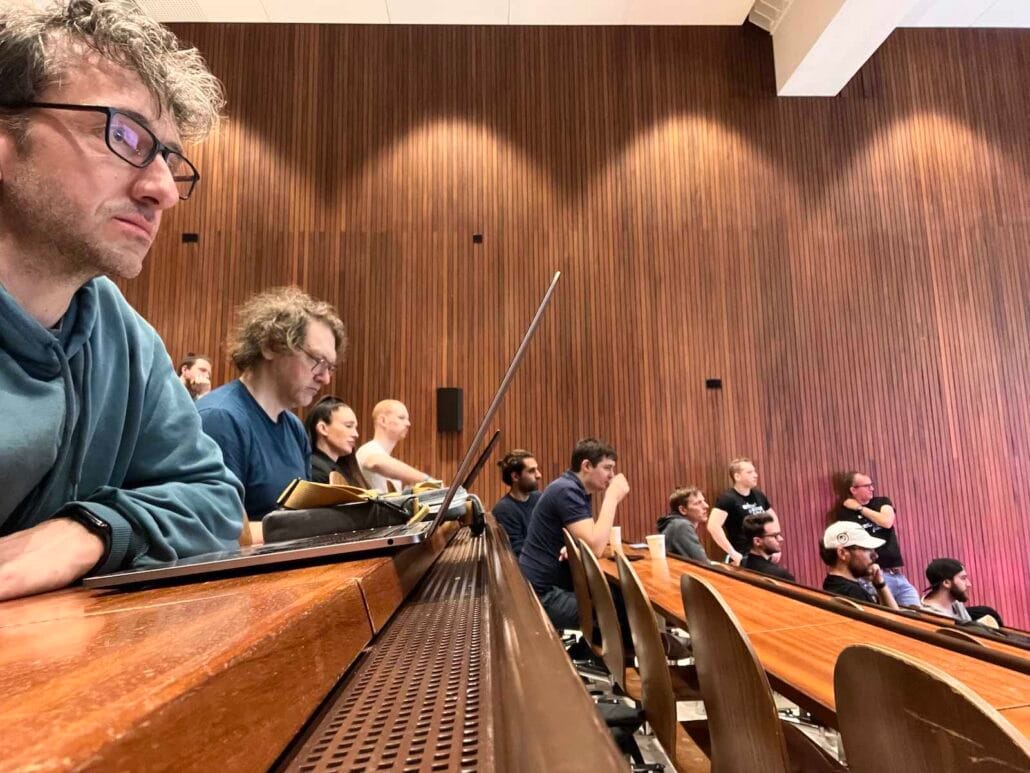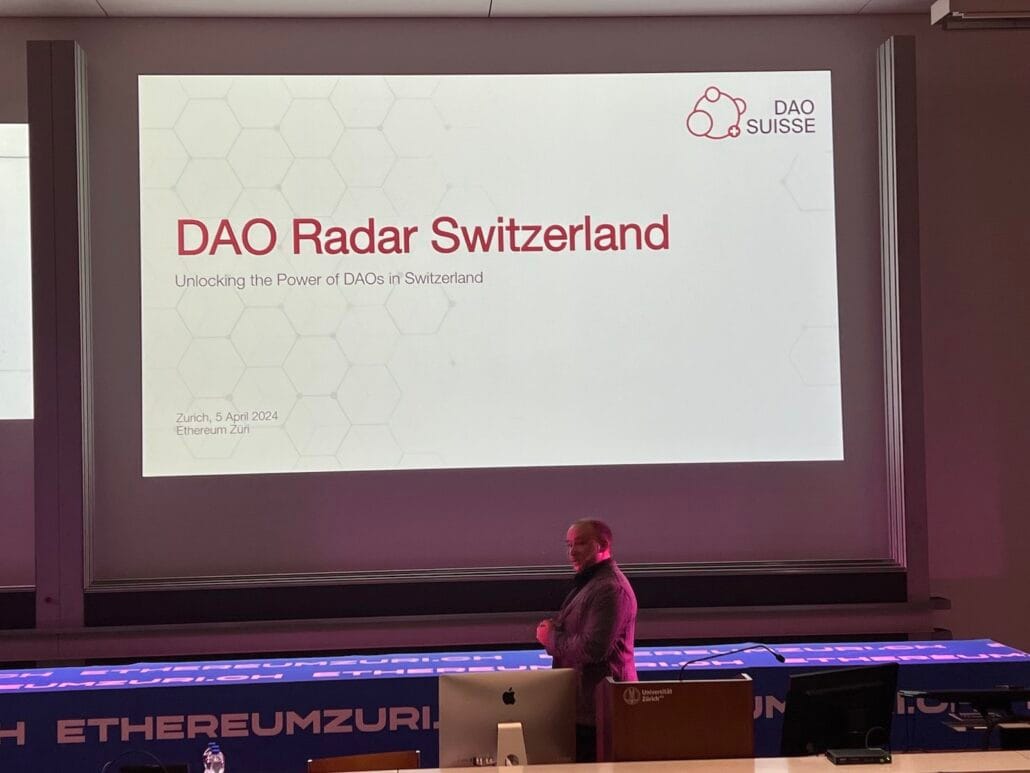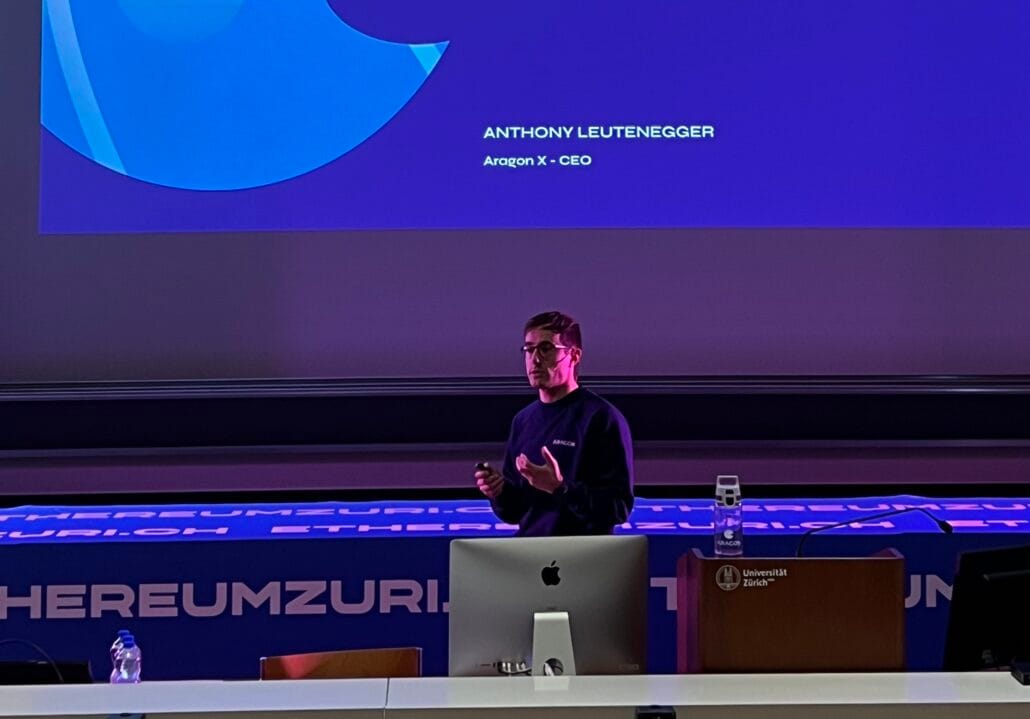On the second day of EthereumZuri.ch which took place last weekend at the University of Zürich, I attended two interesting presentations about Decentralized Autonomous Organizations (DAOs). Switzerland stands out globally, offering DAOs reliable legal foundation and an unmatched community, establishing itself as a perfect destination for DAO growth and innovation. Founding member of DAO Suisse and FTW DAO, Ben Hoelzl, presented preliminary findings on the DAO ecosystem in Switzerland from the upcoming DAO Radar Switzerland report.
He discussed the motivation behind creating the report, which was to answer common questions about DAOs and provide a comprehensive view of the ecosystem, including service providers, blockchains, and communities in Switzerland. The report, expected to be published in May or June 2024, is based on interviews with DAO operators and service providers and aims to address legal, taxation, tech, tooling challenges, and trends.

What is a DAO?
The report includes 40 interviews that yielded 60-70 different definitions of DAOs, reflecting the lack of a common understanding. Ben shared his favorite definition and the academic perspective on DAOs. He then described the Swiss ecosystem, highlighting its uniqueness due to legal clarity and a strong support network for DAOs.
A DAO is a community or a group with a shared bank account, which works towards a joint digital foundation.
Ben Hoelzl at Ethereum Zuri.ch 2024
Only very few DAOs are real DAOs, but in general people agree that DAOs encompass collective ownership, joint decision-making via voting and collaboration.
Definitions from interviews conducted for DAO Radar Switzerland 2024
- A DAO is an organizational structure where stakeholders vote on proposals without a central leader.
- A DAO is a group of people who are coming together for a specific purpose, performing core functional activities in a decentralized manner.
- A DAO is an organized group chat with a collecdtive bank account, where members collaborateivley make decisions to achieve a shared mission.
- A DAO operates without central leadership emphasizing transparent decision-making and collectdive ownership.
Legal and Taxation Challenges
Ben emphasized the importance of having a legal wrapper for DAOs to interact with the traditional world, such as opening bank accounts and entering contracts. Taxation is complex for DAOs, especially with on-chain voting and tokens, and there is a lack of software to track transactions.
Technical and Tooling Challenges, Trends and Future Activities
DAO founders often question which blockchain to build upon, with most DAOs in the Ethereum ecosystem. Common tools include Telegram, Discord, Twitter, and Notion. DAOs face challenges in community building, financial sustainability, legal compliance, and governance. Trends include community splits, decentralized science, and governance models. Voter fatigue and public treasury management are pressing issues.

The DAO Switzerland ecosystem report aims to be actionable for founders and policymakers. Ben mentioned the launch of a DAO launchpad and the organization of conferences and working groups to make Switzerland a global hub for DAOs. Questions from the audience addressed the comparison of DAOs with associations, the practical problems DAOs solve, the decentralization of DAOs, and the use of tokens within DAOs. Ben provided insights based on his experience and the findings from the interviews conducted for the report.
Full Stack DAO Technology
Right after Ben’s talk, Aragon founder Anthony Leutenegger introduced the concept of DAO modularity. Aragon, established in 2017, has been part of the DAO community since early 2018, managing over $40 billion in TVL (Total Value Locked). In the previous year, Aragon launched a new tech stack designed to address past issues and support future DAOs with a focus on modularity.

Current State of DAO Governance
Anthony discussed the challenges faced by DAOs, including a lack of reliable and secure governance tools, cookie-cutter solutions, and voter apathy. He emphasized the need for flexible governance models to accommodate the diverse goals and structures of different organizations.
Custom Governance Builds and Modularity
Aragon offers custom governance builds for organizations with resources, but aims to make this accessible to others through a modular stack. Anthony highlighted the importance of modularity in infrastructure and DeFi, and introduced Aragon’s new DAO framework, which separates governance logic from the DAO contract and permission manager, allowing for secure and adaptable governance.
Examples of Modular Governance
Anthony provided examples of modular governance, such as multi-chain governance for DAOs with assets across different chains, and multi-body governance systems that allow for granular permissions within a single DAO. He also discussed optimistic governance, which has gained popularity and is being actively built upon by DAOs with over $1.5 billion in TVL.
Network Effects and Democratization of Governance
The modular stack allows for network effects, where once a plugin is created, it can be reused by any other DAO. This creates a marketplace for governance and democratizes access to governance tools, enabling smaller DAOs to adopt advanced governance models without the need for extensive resources.
Future-Proof Governance and Resilience
Anthony talked about the importance of future-proof governance that allows DAOs to adapt and evolve over time. He stressed the need for DAOs to have the ability to change as they mature, drawing parallels to nation-states and organizations that are not static.
Aragon’s Business Model and Support for DAOs
In response to audience questions, Anthony explained Aragon’s business model, which includes custom DAO builds for clients and potential revenue from integrations with other platforms. He also mentioned that Aragon provides support and education for DAOs, but does not currently offer incubation through grants.
DAO Adoption and Incubation Support
Anthony shared that thousands of DAOs have launched on Aragon’s platforms, with the newer stack hosting smaller, more scrappy DAOs. While Aragon does not provide financial incubation, they offer support and educational resources for DAOs looking to launch and manage their operations.
While Aragon is one of the leading DAO platforms, there are a few other full stack technologies that provide similar functionality:
- DAOstack – An open-source project that provides a framework for building DAOs, including governance, funding, and decision-making tools.
- Colony – A platform for creating and managing decentralized organizations, with features like task management, payouts, and reputation systems.
- Moloch DAO – An open-source framework for creating DAOs focused on funding public goods and open-source projects.
- These platforms all aim to make it easier for groups to organize, govern, and collaborate in a decentralized manner using blockchain technology.
However, Aragon appears to be one of the most mature and widely-used DAO platforms based on the search results.
I’m really grateful to Duct Tape and the University of Zürich’s Blockchain Center for orchestrating the 2nd edition of Ethereum Zürich, a pivotal gathering that continues to highlight Switzerland’s standing as a beacon of blockchain innovation. This event, faithfully aligned with the conference’s manifesto, provided a unique platform for professionals, researchers, and enthusiasts from around the globe to converge in one of the hearts of innovation—Zürich. It fostered an environment of learning, connection, experimentation, and engagement, thereby enriching the global blockchain community’s collective knowledge and passion. Their efforts in bringing this vision to life are very much appreciated by all who had the privilege to participate and witness the vibrant synergy of the Swiss blockchain ecosystem.
